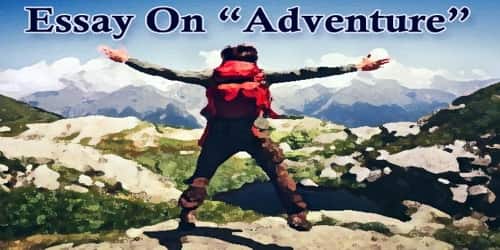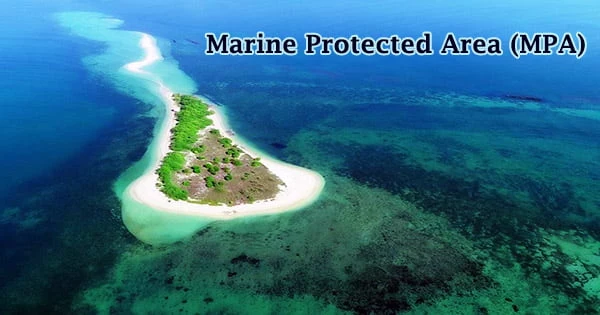Introduction: ‘Adventure’ means the act of going out in search of a thrilling experience and the unknown. Adventures may be activities with some potential for physical danger such as traveling, exploring, skydiving, mountain climbing, scuba diving, river rafting or participating in extreme sports. To do a thing without any profit or publicity is foreign to our nature and temperament. If we go out on a journey, we do so with some objects, on business that will bring/earn a profit.
Adventures are often undertaken to create psychological arousal or in order to achieve a greater goal such as the pursuit of knowledge that can only be obtained in a risky manner.
Important in life: Adventure is so important in life because it is a way of learning and experiencing life. It helps people get out of their comfort zones and create new and lasting relationships with the world and those around them. Adventurous activities can also lead to gains in knowledge. Adventures reduce stress and depression; the stress of work and daily demands can distract us from what we find to be actually meaningful and interesting. At least two or three holidays take in One year to find ourselves and reduce stress. Traveling gives us the opportunity to step away from the daily grind. The new events and experiences help rewire our brain remove depression, hence boosting our mood and self-confidence.
The adventure needs the strength of mind, the spirit of heroism, witty, bravery, perseverance and unswerving determination. No great work can be performed without anyone of it. The difficulty for the unknown that lies ahead is too great. We will overcome it in the long run. The adventurer is to overcome the difficulty whatever may it be. The spirit of adventures does not care about any danger or difficulty for a straw.
Reasons for Adventure: The spirit of adventure finds expression in a variety of ways and means. People go out mountaineering or on voyages of exploration in quest of new frontiers. So great is their love and interest in adventure. That they are not afraid to sacrifice lives in the pursuit of taking the challenges.
Adventurous experiences create psychological arousal, which can be interpreted as negative or positive. For some people, adventure becomes a major pursuit in and of itself. According to adventurer André Malraux, in his La Condition Humaine (1933), “If a man is not ready to risk his life, where is his dignity?” Similarly, Helen Keller stated that “Life is either a daring adventure or nothing.”
The snow-capped the Himalayas or the ice-bound Antarctic or the wilds of Africa or the Deserts of Central Asia hold no terror for them, rather beckon them. And now men are being sent into the outer space, into the Moon where life does not exist. Columbus, voyaging across the strange and unknown seas, Marco Polo to find the silk route or the aeronauts into the outer space still bears testimony to man’s eternal spirit of adventures.
Effects of Adventure: Adventure has a great effect on a man’s life. It makes a man brave, hardy and of indomitable spirit and dauntless temper. It makes him the master of his destiny. It teaches him to be bold, enterprising and daring, not yet desperate. There is something of the gambler’s instinct in one who seeks the unknown; he must take chances but never foolishly rash.
He must know how to balance his means against his ends. He must be vigilant and resourceful. Adventure stimulates man seriously. The incumbent cannot help going out. In the case of any adventurer, adventure makes the way a bit dangerous but with a concrete idea.
Stimulation of Adventure: The spirit of adventure is open to cultivation and has to be fostered. It is good to forget about life and death when one faces risk with courage and determination. It acts as a tonic and stimulant. It also adds zest to life. Now a young man can go out without any companion but entirely on his own initiatives and see the world for himself. The adventure begins with running away from home.
It is a dare-devil spirit that steels the nerves. It reacts to the character and the outlook of the adventurer as well as the nation. Adventure is an internal instinct that gives one stimulation to go out in quest of the unknown. Allah has created many thrilling, unknown and surprising things in the universe. All but a few can know and see them. They can conquer them.
Conclusion: All the adventurers possessed some extraordinary qualities which we still lack. Colombus, a normal sailor, discovered America by dint of his strong will, bravery, and a strong determination. Both Hillery and Tenzing climbed the Everest peak by dint of perseverance, hardihood, strong will, ready wit, and brevity.
From ancient times, travelers and explorers have written about their adventures. Journals that became best-sellers in their day were written, such as Marco Polo’s journal The Travels of Marco Polo or Mark Twain’s Roughing It. Others were personal journals, only later published, such as the journals of Lewis and Clark or Captain James Cook’s journals.
Adventures actually make us more intelligent; we found that all we need to do to reclaim the benefits of travel is to visualize it on a trip. By doing this, both our creativity and self-awareness are promoted. Keeping in mind, it should not take a rocket scientist to know the benefits of going on a real real-life adventure.
Information Sources:
















